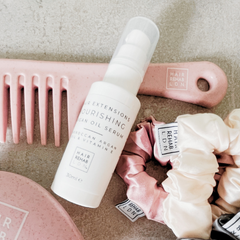
Can the Health of Your Hair Diagnose Health Conditions?
Your hair is often considered your crowning glory, and rightly so. Beautiful, healthy hair can boost your confidence and enhance your overall appearance. But did you know that your hair can also provide valuable insights into your overall health? In this blog post, we'll explore the fascinating connection between the health of your hair and the potential to diagnose underlying health conditions. Let's dive in and uncover the secrets your locks might be hiding.
Understanding the Connection between hair and health
Hair is more than just a fashion statement; it's a remarkable indicator of your well-being. The condition of your hair can provide clues about various health issues. Here's how:
Nutritional Deficiencies:
Dry, brittle hair can indicate a lack of essential nutrients like vitamins A, C, D, and biotin also protein deficiencies may lead to weak, thinning hair.
Hormonal Imbalances:
Changes in hair texture, such as excessive hair thinning or excessive hair growth, can be linked to hormonal imbalances. Conditions like polycystic ovary syndrome (PCOS) and thyroid disorders often manifest in hair changes.
Stress and Mental Health:
Excessive stress can lead to hair loss and breakage. Trichotillomania, a hair-pulling disorder, is associated with anxiety and stress.
Autoimmune Disorders:Alopecia areata, an autoimmune condition, causes hair loss in patches. Lupus, another autoimmune disease, may result in hair thinning and loss.
Scalp Health:
Dandruff, excessive oiliness, or flakiness can be signs of scalp conditions or fungal infections.
Medication and Treatment Side Effects:
Chemotherapy and certain medications can cause hair loss or changes in hair texture.
Early Detection through Hair Analysis
Identifying potential health concerns through your hair is not a substitute for professional medical diagnosis, but it can serve as an early warning system. If you notice significant changes in your hair's texture, thickness, or overall condition, it's essential to consult with a healthcare provider. They can perform necessary tests and examinations to determine the underlying cause of these changes.
Promoting Hair and Overall Health
Maintaining luxurious locks and good health go hand in hand. Here are some tips to ensure both:
- Balanced Diet: Consume a diet rich in vitamins, minerals, and proteins to support hair health.
- Manage Stress: Practice stress-reduction techniques like meditation and yoga to keep your hair stress-free.
- Regular Exercise: Physical activity promotes blood circulation, which can benefit your scalp and hair.
- Hydration: Stay hydrated to keep your hair and scalp moisturized.
- Gentle Hair Care: Use mild shampoos and conditioners such as the Hair Rehab organic haircare range, and avoid excessive heat styling.
- Professional Consultation: If you suspect any health issues related to your hair, consult a healthcare provider promptly.

While your hair can provide valuable clues about your overall health, it's essential to remember that it's not a definitive diagnostic tool. Instead, consider it a mirror reflecting your well-being. If you notice significant changes in your hair, use it as a prompt to prioritise your health and seek professional guidance. By nurturing your hair and your body, you can maintain a beautiful appearance and a healthy life.
Incorporating these insights into your hair care routine can help you maintain not only gorgeous locks but also a deeper connection to your overall well-being. Your hair is your body's silent messenger, so listen closely to what it's telling you, and take action to ensure both your hair and health are at their best.
Embrace the connection between your hair and your well-being, and let your locks shine with confidence.
